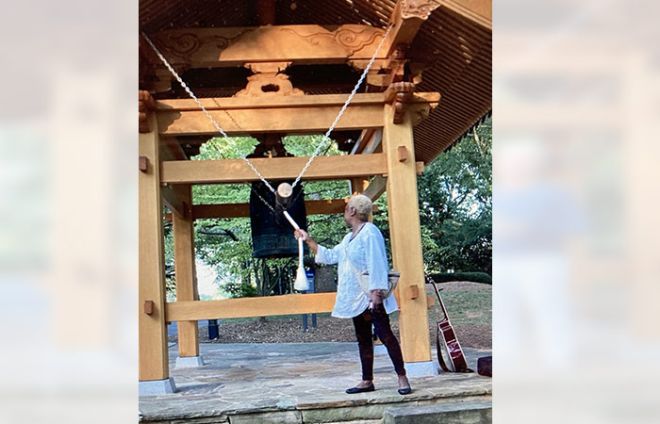Atlanta Chapter Calls for Ban of Nuclear Weapons on Nagasaki Day
Published on September, 41 2024
WILPF member Regina Ross strikes the Peace Bell on the grounds of Jimmy Carter’s Presidential Library and Museum. Credit: Peggy Dobbins.
By Peggy Dobbins
Atlanta Chapter
September 2024
On Nagasaki Day, members of the Organizing Committee for the Atlanta chapter of WILPF US sent a WILPF petition to the US President and Vice President calling for support for the Treaty on the Prohibition of Nuclear Weapons. They met at the newly installed Peace Bell on the grounds of the Jimmy Carter Presidential Museum and Library where Nuclear Watch South has organized the Observance for the last 30 years.
Nuclear Watch South released a report in May on the dangers of relying on nuclear power, written by Glenn Carroll, coordinator for Nuclear Watch South, with GA WAND's Executive Director Kimberly Scott and Patty Durand, former president of the Smart Energy Consumer Collaborative. “Vogtle Plant: The True Cost of Nuclear Power in the United States” was based on a study of Georgia’s Vogtle Plant, whose plans to expand its facilities was recently applauded by members of President Biden’s administration.
Carroll, who was at the event, warned that the plant is a danger to the community: "There is no safe level of radiation.The amount of radiation in a running reactor is incomprehensible.
"When Helen Caldicott wrote ‘Nuclear Madness,’ she told us [that] if the contents of one reactor were to escape, it would be a global event — far exceeding the amount of natural background radiation received from the sun and the soil. The Earth has now absorbed the radioactive legacy of four total meltdowns [Chernobyl and Fukushima] and decades of irresponsible dumping of radioactive waste. The waste from reactors is highly concentrated and highly radioactive with a hazardous life of millions of years. The technical and legal term for this waste is ‘spent fuel.’ We have not dealt with even 1 gram in 80 years of nuclear technology,” she added.



